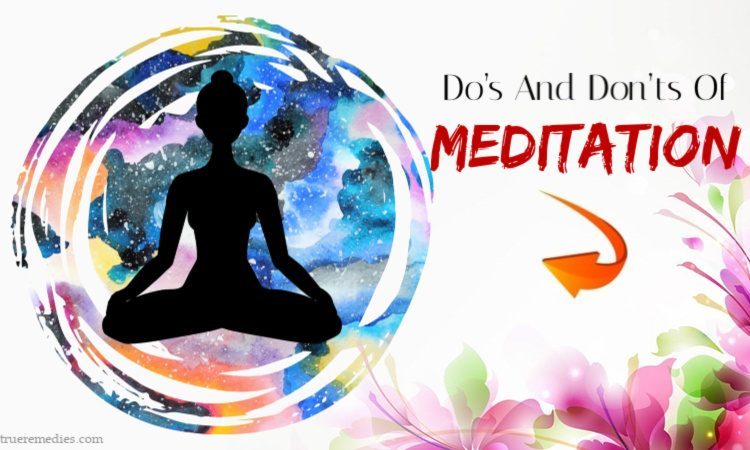Table Of Contents
Meditation is a spiritual practice where people use techniques to quiet the mind and gain a peaceful and stable state. Meditation can be applied to alleviate stress, fatigue, and pain, and boost perception and well-being. Today TrueRemedies will help you know more about meditation and find out the do’s and don’ts of meditation for beginners. Keep reading until the end of the article.
- Kidney Disease And Potassium: Diet Do’s And Don’ts
- Top 16 Do’s And Don’ts Of Weight Loss At Any Age
- Top 25 Proven Treatments For Depression, Anger, And Stress (This article was medically reviewed/fact checked by Perpetua Neo (DClinPsy, UCL; MPhil, Cambridge))
5 Things To Do And 5 Things Not To Do When Practicing Meditation
I. How Much Time Should I Spend On Meditation Sessions?
Do: Divide your sessions into brief ones, 2-3 times a day to get familiar with meditation
Don’t: Begin with intensive meditation. An intensive silent retreat may make you feel not interested in this practice anymore.
II. Which Ways Do I Know Whether My Meditation Trainer Is Qualified?
Do: Make sure to check the qualification of your meditation trainer, how long he or she has been practised and taught meditation, which meditation type he or she instructs you and even what his or her teachers are. You can also make questions about teachers’ achievements. Being known well about your teachers may help you trust them and follow their lessons. In traditional meditation, 5 years of frequent meditation practice and teaching is the minimum requirement
Don’t: Take part in a class without checking any information of your meditation instructor’s qualifications. You have to be cautious because there are many trainers who have only attend an 8-week course or two retreats and some who do not practice meditation regularly.
III. How Long Do I Practice Meditation To Get Its Wonderful Benefits?
Do: It is important to remember that you will not experience the advantages of meditation after a night. One instant benefits of meditation can be a calmer feeling after a short time of practice. However, the feeling is often brief and transient. If you practice meditation correctly and in a long time, it may affect your thoughts and feelings within and outside of each session. The benefits of meditation you receive will likely depend on different factors such as meditation type, your momentum, and the quality of your practice.
TrueRemedies Partner Solutions

Need a Help from the Leading Expert Online, Available 24/7?
They’re all here and ready to answer your questions online or by phone. Keep asking questions until you get the answer you need.
Don’t: Believe that a few minutes or a few sessions of mediation may help you have peace. It has been said that people who get 10 minutes of practice per day during 16 weeks may be better at their attention. Nevertheless, to keep any meditation effects stable, the practice needs to be done on a regular basis. That is also the same case for any brain changes. Meditation can affect the brain, but the interruption in practice seems to reverse several changes.
IV. What Is The Meditation Type I Should Practice?
Do: Meditation can be divided into six types which are mindfulness, spiritual, focused, movement, mantra and transcendental. Search for your meditation motivation, if you are looking for ways to fight against stress or depression, a mindfulness-based tension decrease, mindfulness-based cognitive therapy or self-compassion class might be suitable for you. Or if you wish to enhance your concentration, focused meditation using any of the five senses might be an ideal choice for you.
Don’t: Suppose that all types of meditation involve closing eyes and sitting in silence. Some meditations consist of movement; others involve visualization. Some meditations do not encourage closed eyes during meditation to benefit the transfer of meditative states into daily activities. In long-term meditation, the right type of meditation may help create motivation for you to practice regularly.
V. What Time Can I Start Meditating?
Do: Ask your meditation trainer, whether it is the appropriate time for your meditation. Mindfulness-based stress reduction is typically contraindicated in serious mental health disorders or extreme life crisis. This is because the practice may raise your awareness of the struggles and then increase misery. Some experienced meditation trainers provide personal meditation practice for people who suffer from acute mental illness or face many difficulties in their lives.
Don’t: Presume that meditation will solve all your problems immediately when you begin meditating. Meditation practice may help you recognize your unhealthy behaviors and habits. Meditation may assist you in adapting and working with these.
We hope that the do’s and don’ts of meditation above may support you to understand more deeply about meditation practice and help you find a reason to start. If you want more information on health topics, you can go to our page News & Facts. Leave all your questions about meditation in the comment box; we will respond as soon as possible. Thank you for reading!









